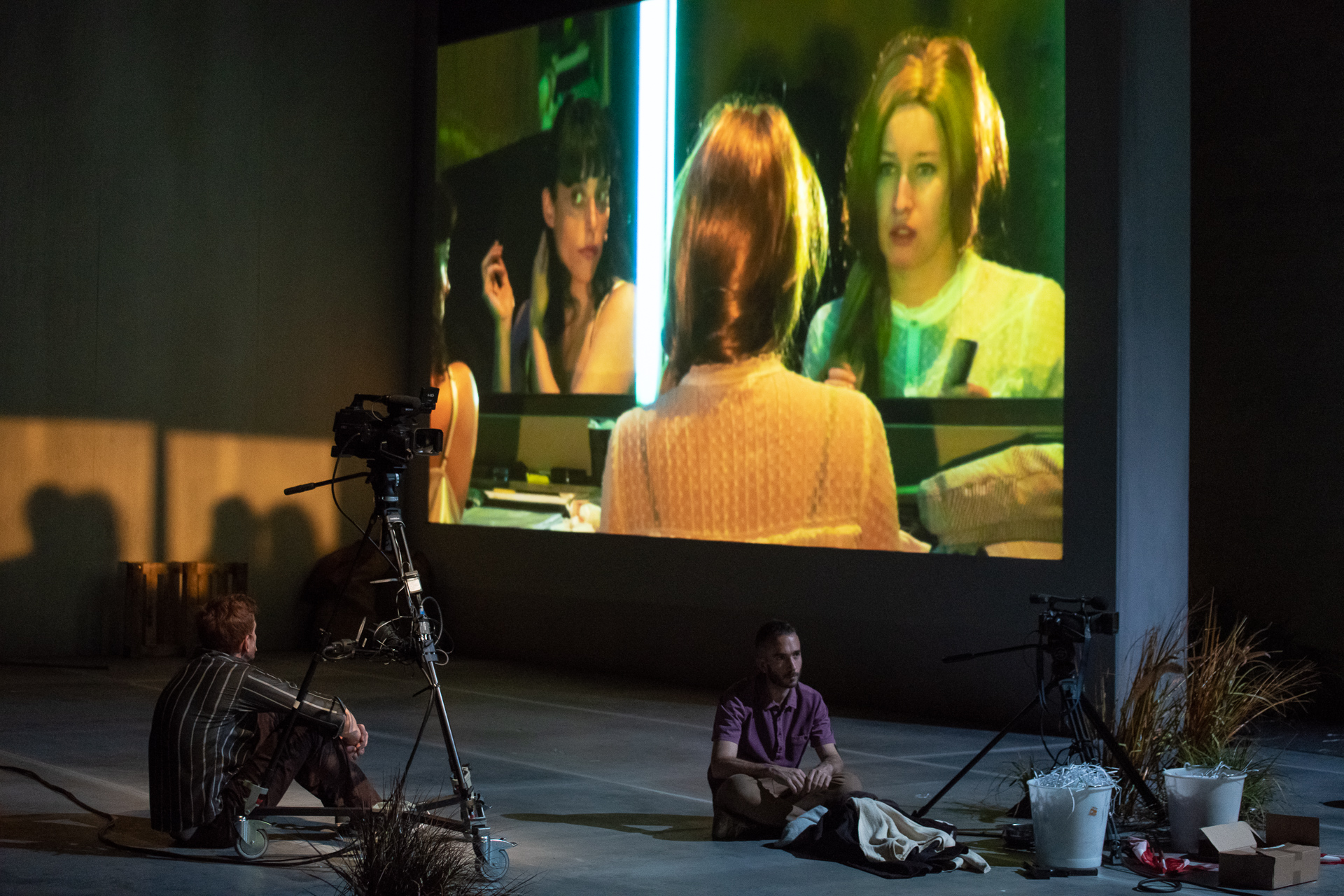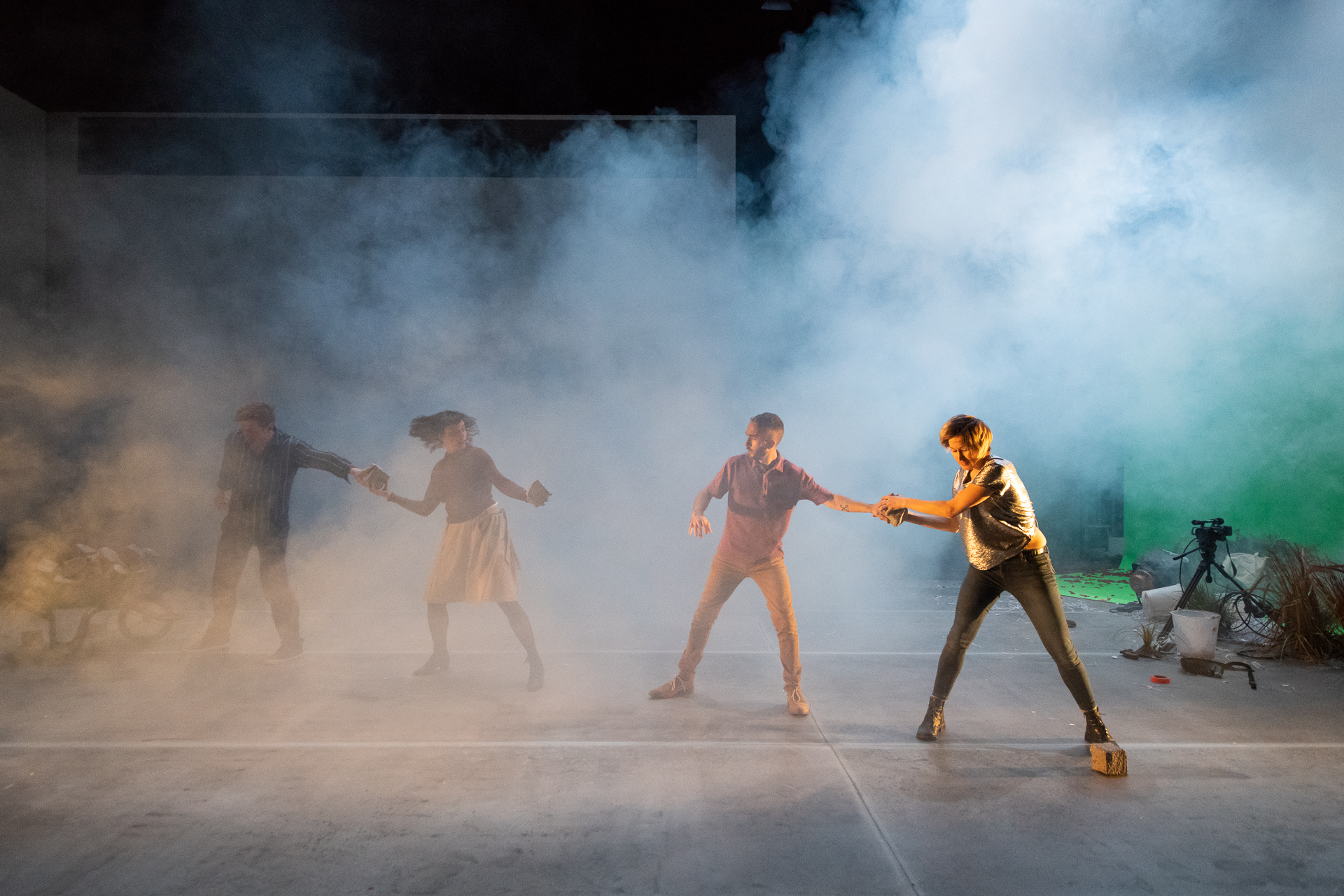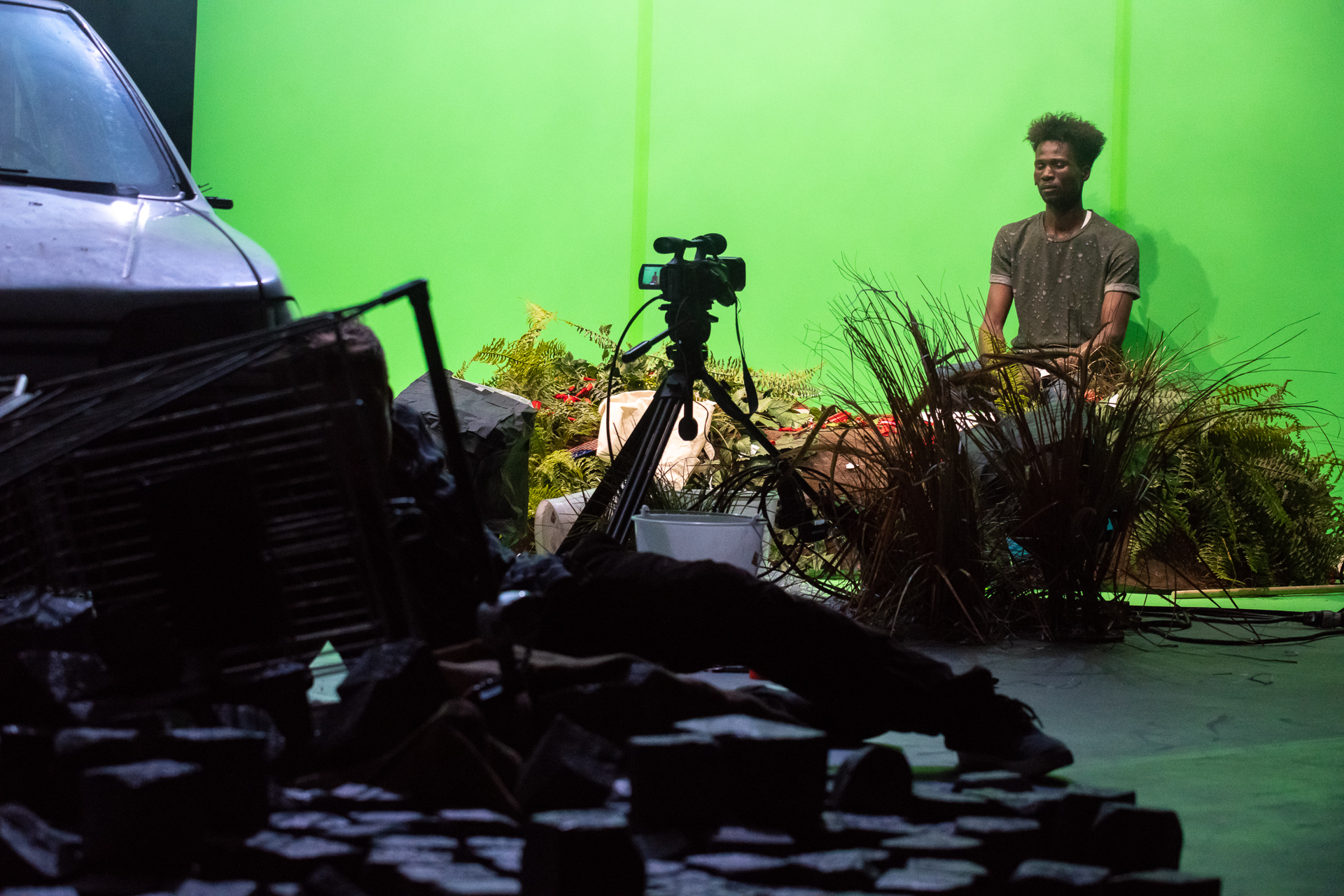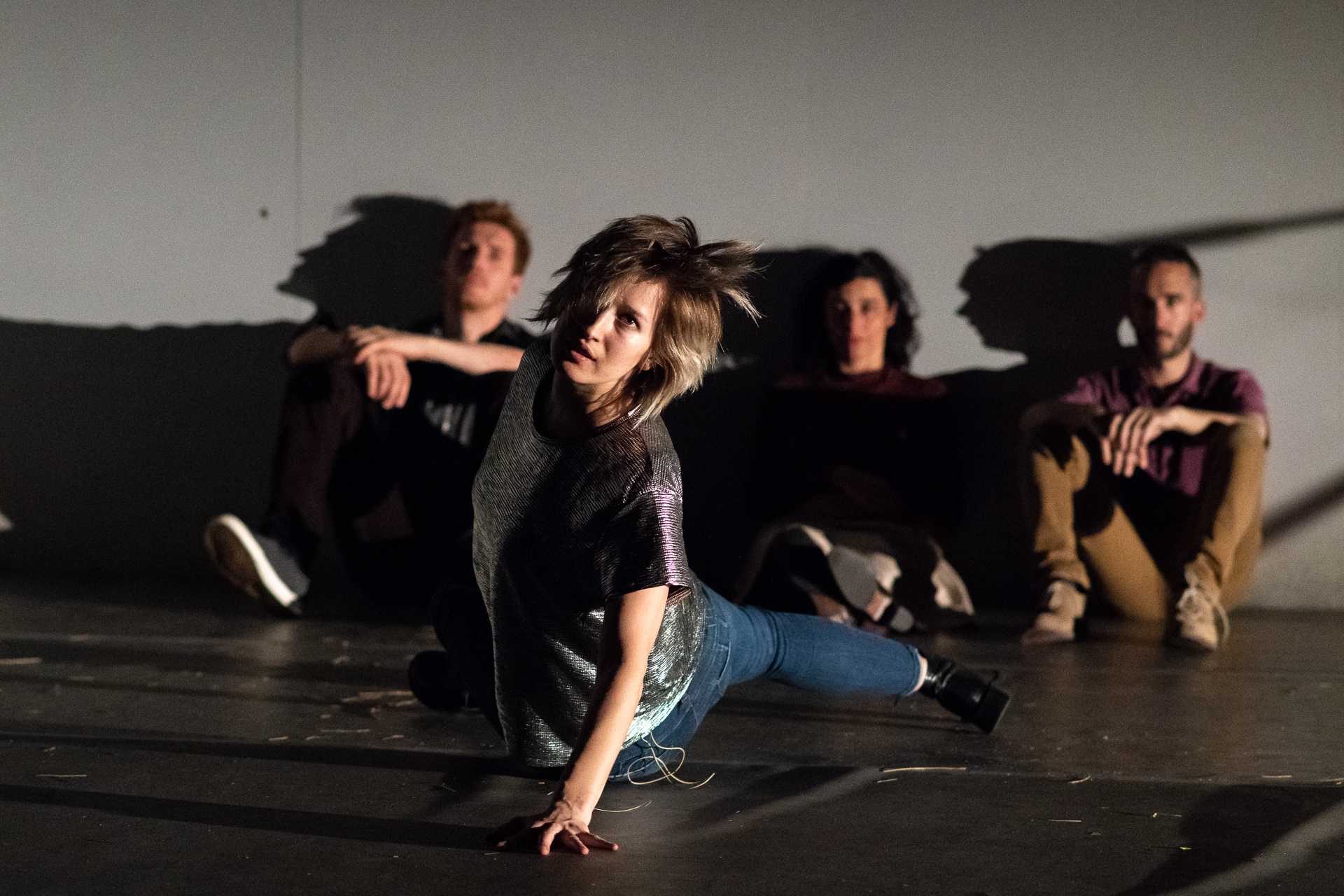 "A sensitive and political interrogation of our own abilities (and limitations) to write stories and create documents."
"A sensitive and political interrogation of our own abilities (and limitations) to write stories and create documents."My Revolution Is Better Than Yours (2018)
Performance with 5 actors in a film set studio set upIn May 2018, half a century will have passed since the riots and strikes in France created one of the most iconic cultural landmarks of the XX century. But the student protests in Paris were only one face of a global network of self-organised grassroots movements and rebellions — from the Black Panthers and demonstrations against the Vietnam War in the USA; to the student protests in Western Europe, including those in Spain, Italy and Sweden; to the convulsions in the Eastern Bloc, with the students’ rebellion in Belgrade, the Prague Spring, the political crisis in Poland, and even the protests at the Red Square in Moscow. After the initial explosion of enthusiasm, most of these movements splintered into a range of positions on the political spectrum: from the neoliberal mainstream to left-wing extremism, from the middle class centrism to radical conservatism.
My Revolution Is Better Than Yours is inspired by the protests of ’68 as one of the first genuinely global phenomenons, its potential legacy, as well as perceptions of this turbulent period from half a century distance. Based on the wealth of archive materials and testimonies of the events’ participants from different countries, Sanja Mitrović’s new production considers the breadth of lived experience and historical amnesia, the effects of words and the meaning of actions, and the possibility of remembrance and commemoration. Unfolding through a constellation of characters, ideas, images and statements which relay the fragmented character of the era, My Revolution Is Better Than Yours lets the complexity of ’68 reverberate with the current situation. Are the revolutionary ideals confined to the dustbin of history and marketing slogans of global corporations, or do they still to talk to our experience today?
Cast And Credits
Concept / Text / Direction: Sanja Mitrović. Performers: Vladimir Aleksić, Jonathan Drillet, Mohammed Nour Wanz, Maria Stamenković Herranz, Olga Tsvetkova. Dramaturgy and research: Jorge Palinhos, Karel Vanhaesebrouck. Choreography: Sanja Mitrović. Stage design: Elodie Dauget. Costumes: Alexandra Sebbag. Light design: Giacomo Gorini. Sound design: Vladimir Pejković. Assistant Director and English Translation: Siniša Mitrović. French Translation: Dominique Hollier. Technique Audiovisual and Film : Melodie Chabret. Technique Audiovisual: Saul Mombaerts, Bram Verboom. Technique light: Bob Cornet. Assistant Director (Intern): Audrey Gary. Choreography Advisor: Guillaume Marie. Dramaturgy advisor: Marie Vandenbussche-Cont.
Production: Sanja Mitrović / Stand Up Tall Productions (BE) in cooperation with Centre Dramatique National Nanterre-Amandiers (FR). Co-production: Centre Dramatique National Orléans (FR), Centre Dramatique National La Comédie de Reims (FR), La rose des vents, Scène Nationale Lille Métropole (FR) / NEXT Festival. Executive production: Caravan Production (BE). Funded by: Vlaamse Gemeenschap. Supported by: Koninklijke Vlaamse Schouwburg (BE), Pianofabriek (BE)
Press
Sanja Mitrović propels us into a sensitive and political interrogation not ofthe “truth” of’68, to which we should restore its missing narratives (of Eastern Europe in particular), but of our own abilities (and limitations) to write stories and create documents. (…) At the same time, she reveals how enactment pervades all forms ofrepresentation – be it those ofa televised documentary, a heroic and monumental discourse, a heartfelt and immanent act ofspeaking, or even a film like Viva Maria!, a little bit flawed, a little bit forgotten, but still providing a fair share ofchildishness, romance and fiction which, it must be admitted, we also need to believe in for a new spring to happen. (…) The creative revival of documents in Mitrović’s show has no redemptive or corrective aims. It is not only turned towards the past which needs healing, but displays a concern with what’s to come by committing itself, ifwe may say so, towards the creation ofexhibits for the future. This requires more than a work of memory; it requires an acute practice of attention connecting images with which we are in contact and which we already know will not make history.
Movement (in French), 02.05.2018It is a wistful, episodic work featuring performers from France, the former Yugoslavia, Russia and Spain; each episode examines revolutions and the backlashes to them.
NY Times (in English), 17.05.2018
The whole show appears as a fresco demonstrating that so-called “revolutions” which have swept over the last few decades have resulted, at best, in provoking more or less significant societal changes, and not much else. (…) Mitrović’s direction happens to be permeated with laughter. She constantly navigates between, on the one had, an indisputably documentary aspect, which refers to testimonies and images of events invoked on the stage, and, on the other, a play built on dynamism of actors, who swiftly change from one role to another and posses the physical and mental energy for authentic performances which keep intact the lighthearted pleasure of childhood. There is abundance of ideas and a variety of scenic procedures. Dimensions of space change with each sequence.
Rue Du Théâtre (in French), 27.11.2018The alteration between almost journalistic testimony and quirky performance gives the piece a rhythm which does not run out of steam – thanks to the energy of the actors – and a depth of field – thanks to the use of the camera. Beloved by contemporary theatre, in recent years camera has often taken central place, sometimes unconvincingly or even unnecessarily so. Here, it is used intelligently. On the one hand, the camera refines the stories through emotion which emerges from the brutality of being filmed. On the other, it laughs, fondly and without contempt, at cinema which wants to make everything sexy: war, death, revolution.
(…) The director and the actors allow us to understand a vision of their art: if it wants to make viewers think, theatre must not take itself too seriously. (…) In this sense, the piece does not offer a smooth outcome, a “representation” of the revolution, but a process of reflection which dissects and explores through language, dance, the body, fiction, the real. And this may be a lesson which echoes the Brechtian concept: to awake critical consciousness, the audience must not be a mere spectator of a perfect image but a witness to a set of ideas which unfold on stage. That is the pleasure of going to theatre, to be presented with a question rather than an answer.
L’Après-Vu (in French), 28.11.2018




